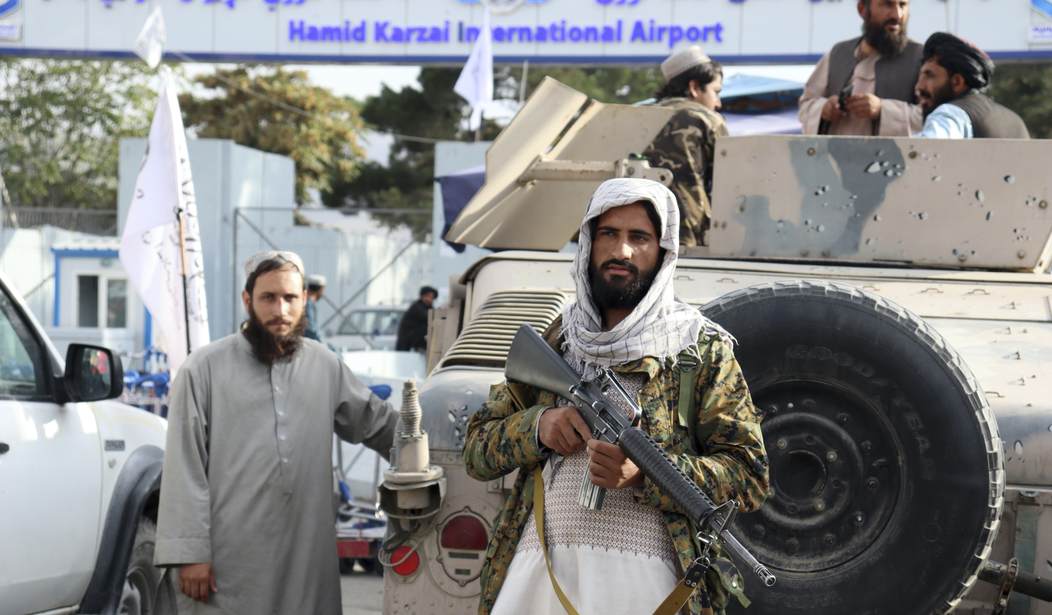The one-year anniversary of the fall of Afghanistan to the Taliban is fast approaching. It was a disastrous ending to the 20 years the United States spent in the region—one confirmed by a "damning" 2,000-page Army report that highlighted the Biden administration's stunning failure to recognize what was happening on the ground leading up to the withdrawal. The chaotic exit eventually turned deadly when 13 U.S. servicemembers and approximately 170 Afghan civilians were killed by a suicide bomb. The Afghan people's misery didn't end there, though. In the year after the withdrawal, the country's economy collapsed, leading to a widespread humanitarian crisis brought on by myriad factors, including the end of government services, the Covid-19 pandemic, drought, rising inflation, and the curtailment of foreign aid.
Now, Washington is reportedly in talks with the Taliban over releasing billions in frozen Afghan government assets.
The US and the Taliban are negotiating the release of $3.5 billion in Afghanistan's reserves that were frozen when the Taliban retook control of the country, Reuters reported.
Three unnamed sources told Reuters that officials have exchanged proposals for how the release could be done. [...]
The US froze Afghanistan's $9.5 billion in reserves — some which is held in New York City — after the Taliban took over in August 2021. The Taliban have repeatedly asked for it back, citing the country's economic crisis after the takeover.
Current negotiations are on $3.5 billion of that amount, Reuters reported. President Joe Biden signed an executive order in February to say that amount could be sent to Afghanistan as humanitarian aid.
Aid groups also called for Afghanistan's reserves to be given back, saying it would help ordinary Afghans buy food and fuel in the face of a humanitarian crisis. (Business Insider)
There are reportedly some hangups on both sides, however, including the Taliban wanting top political appointees in the Afghan central bank to remain despite one being under U.S. sanctions. Also a point of contention is that the U.S. wants the money put into a trust fund that has third-party control, but the Taliban rejects outside access to the money.
The Taliban says the economy can't function with Western sanctions in place and argues its government must be recognized by the international community – a move stalled over their dismal human rights record and concerns the group will allow the country to be a staging ground for cross-border terror attacks.
A spokesman for the Taliban's ministry of public health, Dr. Javeid Hazheeri, says the Taliban did not expect so many Afghans would be malnourished when they seized power. The U.S. Congress alone appropriated about $138 billion since 2002 on reconstruction in the country. Experts say, however, that not enough international aid funded the kinds of development that address hunger, such as improved access to water and nutrition education for women.
Hazheeri lists the ways the ministry is trying to help, including operating more than 2,300 malnutrition clinics. But he says it's not enough, given the scale of the problem.
He says ultimately, to curb malnutrition, the Taliban government needs the economy to function, which would mean halting Western sanctions: Afghan central bank assets should be released. Afghan banks should be able to conduct cross-border trade. But those are political decisions, which would require the international community to recognize, in some way, the Taliban government. That proposition is complicated by the group's violations of human rights, including denying girls the right to attend secondary school, and issuing rules to enforce the veil in public. (NPR)
In the meantime, the humanitarian crisis rages on, and "if left unaddressed ... could lead to more deaths than twenty years of war," the U.S. Global Leadership Coalition reports.
























